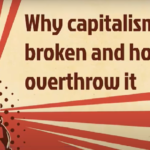On the coming food crisis
At what point do you draw a line through the dots on a graph and call them a trend? At what point do we stop calling talking about “another food crisis” and start accepting we are entering a new era in which our food system is perpetually in crisis – that it has failed?
There is a ‘once in a generation’ heatwave in America’s Midwest. As crops are destroyed, corn, soya and wheat prices are soaring – for the third summer in the last five. Each time this has happened, it is explained away as unusual combination of mishaps: a rare weather event, surprisingly high oil prices, an excess of speculative money looking for somewhere to gamble after the credit crunch, bio-fuels suddenly taking up a higher share of the land, etc.
But the adjectives there imply something: abnormality. “Rare” weather events “high” oil prices. If we look at each of the elements of the problem, do we really expect them to change soon?
Weather events that we used to think of as extreme are becoming normal as climate change unravels: The 2010 food price spike came partly on the back of ‘freak’ a heatwave and leading fires in Russia; and ‘rare’ flooding in Australia and Pakistan. ‘Extreme’ floods in Thailand in 2011 wiped out 14% of the crops of the world’s largest exporter of the stuff. This year, the weather event is “the biggest heatwave in the USA for a generation”. But can we really continue to see these as freak events?
If they are now happening on a major scale in one of the world’s food-bowls more often than not, surely we need to understand that extreme weather is the new norm? Peter Singleton of the Scottish Environment Protection Agency put it best this week: “There is now no such thing as natural weather”.
Likewise, the idea that current oil prices can be expected to dip is unlikely: if oil companies don’t expect them to remain high, why are they investing in expensive marginal fuels like Tar Sands or Deep Sea oil. Similarly, unless we wean the world off cars – or start caring more for the ability of most to eat than the ability of the rich to drive – biofuels will continue to take up land which should be used for food.
Finally, with speculation, do we really think the markets are going to start investing in productive things any time soon? Or that governments are going to successfully band together and regulate? I dearly hope so, but short of some massive changes…
So, surely the time has come to stop thinking of ourselves as lurching from shock crisis to shock crisis, and start seeing that crisis is the new normal: food prices are going to get higher – up to 30% higher this decade than last, according to a new report from the UN’s Food and Agriculture Organisation and the OECD. The last food crisis – 2007-8 – went largely unnoticed in the UK press: it happened alongside our financial collapse, so people were kind of distracted. But it did lead to riots across the world. Likewise, there is a good argument that the Arab Spring was partly triggered by food price rises last year.
We aren’t yet looking at the kind of price spike that was seen in 2008 yet – though one significant weather event could tip us over the brink, according to the Food and Agriculture Organisation. But if the next decade is to be marked by significantly more expensive food, then this is a vast failure of our global economic system. For those who benefit from the system, it is convenient to talk of crises – to imply that these are one off events, the result of bad luck, outliers on the graph. For the rest of us, perhaps we need to be clear that this isn’t a freak.
It was precisely to prevent such weather events that so many of us have fought for so long against climate change and the system which drives us to rely on fossil fuels. It was to prevent such mono-cultures that we opposed monopolising agri-business. It was to stop price hikes that the likes of WDM have campaigned against food speculation. It was because the impact of food prices was forseen that so many have worked so hard against agri-fuels. The failure to deliver food security isn’t a one off, it is not a freak. It is the ultimate failure of an economic system whose time must be up.


Yep, it all looks pretty bleak. The worst part is we still manage to waste so much food, because our money and economic systems value scarcity over abundance – http://www.tristramstuart.co.uk/FoodWasteFacts.html
The People’s Kitchen project in London aims to prevent food waste from going to landfill, and instead cooking it and serving it to the community. But we need this, and re-localised food growing, on a massive scale. Ownership of land is a huge issue – England is basically privatised so really difficult to find any cheap land.
Luckily, the other weekend at OrganicLea’s growing site on the edge of London, the beginnings of a proper UK movement for food sovereignty were made.
See this WDM blog post about it all